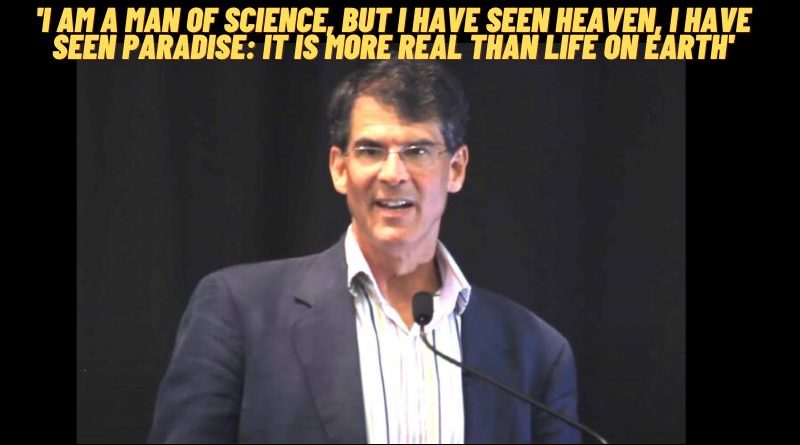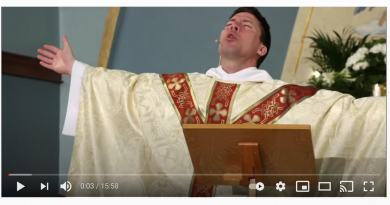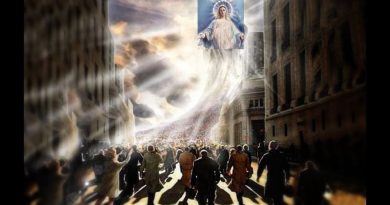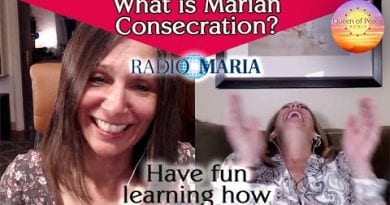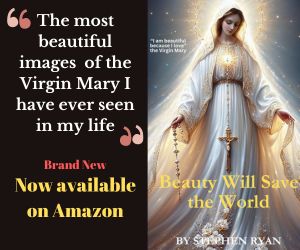‘I AM A MAN OF SCIENCE, BUT I HAVE SEEN HEAVEN, I HAVE SEEN PARADISE: IT IS MORE REAL THAN LIFE ON EARTH’
Eben Alexander, is a man of science, a famous neurosurgeon who has seen heaven. We are transcribing his text from the catholicherald .
“I spend a lot of my days traveling around and talking to people about miracles. Not what is confined to history books or stories of friends of friends, but real miracles experienced by normal people.
That may sound strange enough in this day and age, but if you knew me before November 2008, you’d think it impossible.
I worked as an academic neurosurgeon for years, including 15 years at Harvard Medical School. Since childhood, I read Scientific American cover to cover every month, wanting with all my heart to be the compassionate yet incredibly intellectual doctor my father was.
I attended church and took communion with my wife and children, but I knew that the way to the truth—the real truth, the kind you can see, feel, and confirm, not guess—was through science.
Patients sometimes asked me before or after surgery about death or heaven or other metaphysical questions, but I prided myself on being a rational man, a man of science.
The kindest approach, I thought, was to be gentle but honest. There is no life after death. You think you’re floating above your body during surgery or seeing heaven, but that’s your brain playing tricks on you.It never occurred to me to ask: if your brain is deceiving you, who is the “you” that your brain is deceiving?
There was no hope but prayer
All that changed when I went to bed in November 2008 with a headache that turned out to be much worse than it seemed. It was the worst pain I’ve ever felt. My family left me to rest in bed, but when they came back to check on me a few hours later, they found me in the grip of a massive grand mal seizure. The ambulance took me to the emergency room. I was admitted to the same hospital where I worked and a colleague, Dr. Potter , diagnosed me with gram-negative bacterial meningitis. She is an excellent doctor and gave me the best possible care. Yet when she discovered it was E.coli – a rare and often fatal strain – she worried it was hopeless. Given the diagnosis and the fact that I fell into a coma within three hours of first feeling sick, the statistics showed that I had less than a 10 percent chance of survival. Complications ensued, and doctors’ estimates dropped to a two percent chance of survival, with no chance of recovery. After seven days, they recommended that my family take me off life support. During all of this, my family prayed at my bedside and my friends prayed from afar. The doctors did tests and prescribed me medication. But I wasn’t aware of any of that. I was somewhere else entirely.
I was guided by an angel
While my body lay in the hospital bed, my consciousness – my soul – was experiencing a rich odyssey beyond the physical world. It started as just a speck of awareness in the murky darkness. After a while, I was lifted up by a beautiful rotating light from which an indescribably beautiful melody flowed. Light and melody led me to a green valley bursting with light and life, where I was guided by a beautiful angel resting on a butterfly’s wing. He delivered a message directly into my consciousness, unencumbered by words: you are loved, you have nothing to fear, you can’t go wrong here.
The spinning orb of light answered all my questions about the universe and my place in it in a similar way, with infinite patience and directly into my mind.
A rational explanation was impossible
Sounds like a fever dream, I know. If the patient had told me that story, I would have given him a very nice (but somewhat patronizing) smile and explained that he had hallucinated the whole thing. I would patiently explain to him that his neocortex, the part of the brain responsible for processing and integrating conscious thought, memory, language, creativity, and sensory perception—in fact, everything that makes us human—was lost in an electrochemical firestorm of synapses. But in my case, that seemingly rational explanation is completely impossible. My neocortex is completely shut down. Only the most primal part of my brain—the part that keeps your heart beating—showed any sign of functioning.
That really happened
When I was recovering from my coma and reassessing my experience, my skepticism was one of the first personality traits to resurface. “It seemed too real to be real,” I told my older son. Until my colleagues sat down with me to methodically consider—and ultimately reject—every possible hypothesis about how such a severely damaged brain could produce such a rich experience, I didn’t allow myself to believe what I knew to be true: it really did. happened.
To quote Sherlock Holmes: “When you eliminate the impossible, whatever remains, however improbable, must be true.”
My brain was unable to create anything like what I experienced. And yet I experienced it. So I had to accept the unbelievable: this very real experience took place—not in my brain, but in a realm more real than our earthly realm.
It was a medical miracle
I woke up the same day my doctors reluctantly advised my family to stop critical life support. It wasn’t just against the odds – it was a medical miracle. I came out of the coma with no memory of my life, no recognition of the people who prayed around my hospital bed, and no ability to speak or understand language. But I knew exactly where I was, and the memory remains crystal clear.
Since then, as I’ve visited churches, hospitals, and universities to share my experiences, I’ve made the most important discovery of all: experiences like mine are far more common than I ever realized.
There are many, many such experiences
Everywhere I go, people quietly approach me after lectures and signings to share their own experience. It often starts the same way: “I’ve never told anyone this before, but…” They tell me about near-death experiences, near-death experiences, out-of-body experiences, and other phenomena. Like the man who saw the blue ball of light leave his father’s body just after he took a breath. When he uncertainly asked his sister, “Did something just happen?”, she replied, “You mean that light that just came out of Dad’s head?”
Or the woman who saw her mother-in-law offer her favorite red hat to someone unseen at the foot of her hospital bed, then discovered the hat was gone when her mother-in-law died later that night.
Or the mother who moved to the other side of the country to take her children away from her ex-husband who twisted under the weight of a severe drug addiction. In the middle of a dark, cold January night, as she despaired of their future, an ineffable entity she knew to be God appeared and enveloped her in deep love, rejuvenating her and helping her build a new, secure life for her children.
Sometimes they tell me about literature that changed their lives—a groundbreaking scientific study buried in an obscure journal, an ancient text not yet translated into English, or even famous works by poets like Traherne or Blake, seen in a new light. Or they refer me to a case study, memoir, or legend that has key details in common with experiences reported by people half a world away, a millennium before or since. Their stories and the research they inspired form the backbone of my book Map of the Sky.
I grew up in a household that took for granted the complementary roles of science and religion. My father, a man of deep faith who was active in our church community, was also a pioneering academic neurosurgeon who chaired the department of neurosurgery at his hospital. But it was only after my experience that I realized how science, religion and spirituality are partners in discovering the truths of this world and the next.
The conventional neuroscientific view of the brain—the view I subscribed to before my experience—was constrained by materialist science, an approach to science that assumes that everything is no more than the sum of its measurable physical parts.
Materialist science claims that the brain creates consciousness. He claims that everything we’ve ever experienced, every beautiful sunset, every beautiful symphony, every hug from our child, is just the electrochemical flickering of neurons in a three-kilogram gelatinous mass. Our choices, too, are not made of our own free will; they are only chemical and mechanical reactions to stimuli. And, he says, we are nothing more than our physical bodies; when they die, we cease to exist.
The problem with that model, the materialistic brain-creates-consciousness model, is that even the world’s top brain experts don’t have the first idea how the brain could create consciousness. It’s the modern equivalent of a scientist thinking, well, it certainly looks like the sun rises and sets around the earth, so the sun probably revolves around the earth. Mainstream neuroscience simply hasn’t done its homework.
The debate about mind and body is a 2,600-year-old conversation that has fascinated the world’s most brilliant thinkers, from Plato and Aristotle, through Aquinas to Descartes. But we are on the brink of a change that is unprecedented in all of human history: a radical shift that irrevocably links science and spirituality and reveals the ways in which they have been interconnected all along.
Jesus is right
Consciousness is not created by some combination of physical forces or electromagnetic impulses. Consciousness – our souls, individually and collectively – is fundamental. It is a kind of primary color of the universe and cannot be created by combining other elements. It is our consciousness, our souls, not just our physical existence, that makes us open to miracles and provides a link—cobwebby but stronger than any mere physical material—to heaven and God. This convergence of understanding of our approach to science, our universe and ourselves is the only way forward.
Jesus taught that the Kingdom of Heaven is within us. Before the illness, I thought it was some obscure metaphor, but it’s actually very simple.
That divine spark of consciousness and love in each of us is a direct link to heaven right here on earth. Heaven is the true home of our souls, and miracles happen when we allow ourselves to live in a way that acknowledges that—or when we’re forced to face that truth in its terrible, wonderful, terrible glory.
dr. Eben Alexander is the author of The Map of Heaven: How Science, Religion, and Ordinary People Are Proving the Afterlife (Piatkus Books 2014, imprint of Little, Brown)

